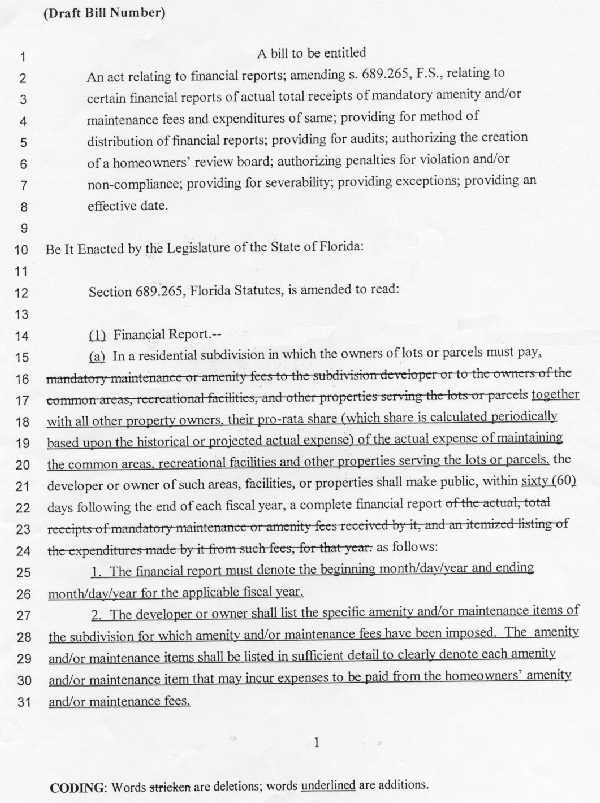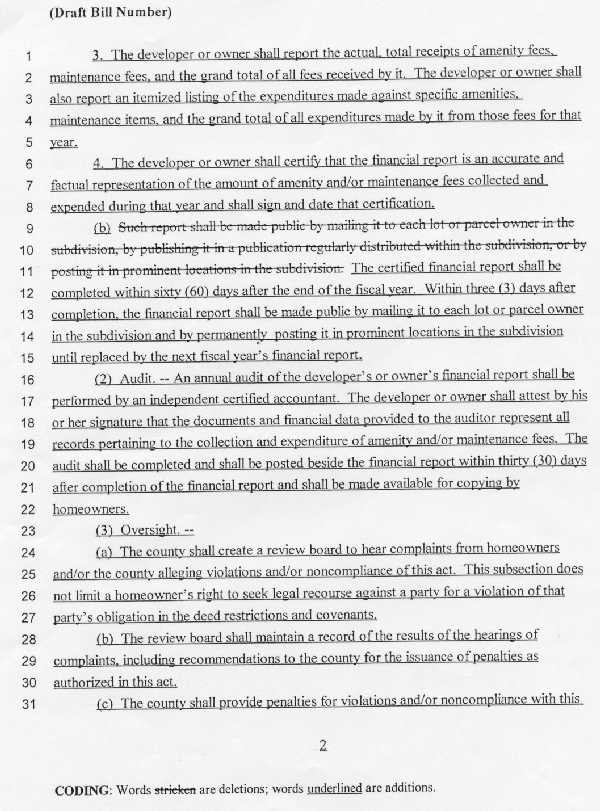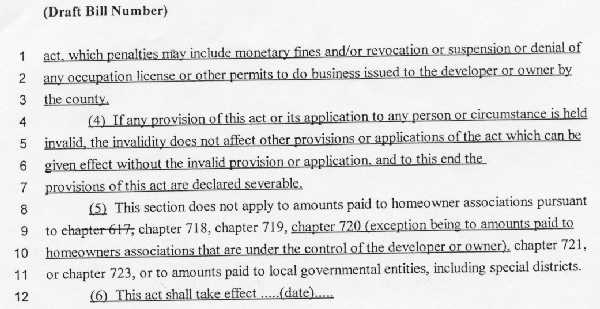

 |
To
Read, please click below!
|


 |
| PROPOSED
DISCLOSURE FORMS
CLICK HERE TO READ! |
On Independence Day we were all well fed
with dramatic readings of the Declaration of Independence, written by Thomas
Jefferson 225 years ago. ABC had engaged many famous actors to give us
all a great reading of this document.
Despite the fact that reforms have been enacted by various legislatures, one major issue is very obvious. Without proper enforcement all these reforms are not worth the paper they are printed on. Since last year CHIP, a Marion county based grass-roots organization, is desperately trying to get homeowners association (HOA) reforms enacted. A Marion County Ordinance 00-20, dated 7-11-2000, was enacted to no avail. Many of the developers plainly disobeyed the required filings, because there wasn’t any possible enforcement. Senator Anna Cowin pledged support for HOA reform during her last election campaign. All she mustered was a local bill in the very last minutes of the legislative session, after 6 drafts and visits to her office by 10 developers and/or lobbyists for the stakeholders, which was doomed from the outset. Hopefully, her constituents will present her with "the bill" during the next election campaign, if she decides to run again? It is definitely of great importance for us, the citizens of Florida, to let politicians know how we feel about broken campaign promises. We really don’t need any more politicians whose interests are more in favor of campaign funds than that of their constituents. According to the latest information (see article below) CHIP is now trying to get another local bill enacted, regarding disclosure and financial reports. The CHIP board of directors seems to be willing to meet with politicians and lobbyists behind closed doors. Activists all over the State are fighting with boards and developers to comply with specific HOA laws for notice of meetings to avoid 'secret' meetings. Do we now want to disregard these issues and start with closed meetings? It will definitely not be to our advantage,
if half-hearted, local reforms will be enacted. The past has shown that
reforms, even if they were more or less useless, gave politicians and lobbyists
the excuse for the next few years, not to touch the same issues again.
Admittedly, after looking through the documents provided by CHIP, lots of work has been invested. The idea of proper disclosure and financial reports is definitely not new and is very necessary. But without the necessary enforcement, all these efforts are wasted. In my opinion it’s no miracle why politicians and lobbyists are jumping on the bandwagon to help pass these bills. They really don’t change any provisions, leave the industry where they want to be – untouchable – and will give everybody involved a good excuse for the next few years again: we just enacted new HOA reform. Nothing will change for the homeowners, as long as the contents of the bills are not enforced by the State. Local enforcement has proven to be unsuccessful and, sorry, no disrespect intended, only got chuckles out of the bigger developers. According to legal sources county government is unable to deal with these deep pocket industry, because they don’t have the necessary means to deal with these problems. Reasons? Personal experience!
Is that what we really want?
Please, don’t let small successes deceive us. Only a complete overhaul of existing laws with provided enforcement will help us. Let us all join forces, combine our experience and let us work together on something, which will really help to provide the necessary protection for the homeowners. Don’t give politicians, lobbyists and industry partisans the public excuse they are looking for: we just enacted some new HOA reforms! |
| To clarify:
CHIP seeking state-wide reform
07/27/01
I want to clear up some misconceptions about Concerned Homeowners in Partnership (CHIP) and its present intent to reform certain Florida law. Jan Bergemann’s letter in last week’s South Marion Citizen triggers this, but is not the sole reason for this reply. First of all, CHIP is not seeking purely local reform in the area of homeowner rights. Rather, CHIP wants statewide reform of a certain specific issue: financial accounting on the amenities, maintenance fees and service fees collected and/or spent by developers from homeowners in deed restricted communities. The specific statute on which CHIP is advocating reform is FS 689.265. Second, CHIP is not seeking reform of HOA (homeowner association) law. HOA law is encompassed in FS 720. 301 et al and CHIP has not promoted any reform of this law this year. No, folks, we are talking, we are fighting, for reform of law affecting developer controlled communities where fees are collected and/or spent by the developer or the management company, with no accountability at all to the homeowners from whom they are collected. We may seek to reform homeowner association law at a later time, but it is not our focus now. However, Bergemann’s statement that statewide reform of FS 689.265 is useless without regulation, without some type of oversight group and some type of penalty for non-compliance, is absolutely correct. As the law now stands, many developers do not even give an accounting, and they get away with it. This is because there is no penalty in the law as it now stands. The developer can just collect, spend, and not account at all. We need some way to rein in the errant runaway developer who flaunts the law and misuses the law-abiding citizens of the community. Bergemann and his cohorts further criticize that local control (giving the county the authority to regulate noncompliance) won’t work. This has been much debated by those in CHIP who drafted the proposed legislation, and still sits heavily in the minds of all who consider the problem. CHIP considered state regulatory control. There is a regulatory agency in place — the Department of Business and Professional Regulation. There is also the Department of Agriculture and Consumer Services. Complaints of fraudulent activity on the part of developers of deed restricted communities can go to these agencies. Problem is, lots of people have been there, done that, and gotten no results. These agencies are bureaucratic, unwieldy, and cumbersome to deal with. CHIP thought that permitting the county to do the regulating would allow for better response, and for faster accountability if that county entity did not do what it undertook to do. The citizens of the county could “rise up and speak up” and their voice would carry more weight in the local arena. Also, the county oversees, supposedly, the development within its boundaries, and the knowledge that a developer is not obeying the law MIGHT carry some weight when the county votes on land use issues or zoning issues brought by that developer. Actually, in Marion County there is an ordinance in place requiring developers to file their financial report with the county. Noncompliance with this ordinance now can bring the matter before Marion County’s Code Enforcement Board. T he concern with this is that the county may not presently be authorized to regulate or penalize offenders, because there is no penalty or oversight provision in the present law. The county has said that it can only do what it has been authorized by the state to do. So we need a change in state law, which gives the county the authority to review noncompliance of the developer. And CHIP realizes that this may not be the best solution, but the homeowners of deed restricted communities are not yet powerful enough to demand statewide regulation. County enforcement would be better than no enforcement. CHIP does not believe that its proposed reform is either “small” or “useless”. What Bergemann and his cohorts seem to be saying is that if we can’t get it all, we should not take anything. But reform of the law regarding homeowner rights in deed restricted communities will not come overnight nor will it come in one tidily complete package, given the history and the tenor of this fast growing state of ours. Reform in the arena of homeowner rights will be the result of a hard fought battle. It will not happen if we stick our heads in the sand and pretend the problem is not there. It will not happen if we demand all or nothing. It will be more likely to come if we work constructively and together, and if we are supported by all the homeowners in deed restricted communities who believe that reform is needed and are willing to show their intent both by joining in this fight and by wielding their ballot at election time. If you have a question, or if you want a membership application, please do call me, Fanny Vail, at 291-9495 or CHIP president Buddy Catledge at 861-1288 (or e-mail: [email protected]). Or you can ask any of our directors. |
| CHIP
approach wrong
Letter to Editor We thank Jim Hunter, editor of the South Marion Citizen, for printing the Letter to the Editor; "Homeowners' reform heading in the wrong direction," in the Friday July 20, 2001 edition written by Jan Bergemann president of Cyber Citizens For Justice, Inc. (CCFJ) Fortunately, the letter was on the same page as the Citizen editorial opinion; "Determined CHIP group's on right path." This enabled contrasting views of how meaningful reform related to homeowners rights might occur in our state. Based on the earlier story, CHIP meets with lobbyist and the editorial opinion, the stakeholders and industry partisan are ready to support the CHIP bill as long as it doesn't contain penalties for failure to comply; independent audit provisions and enforcement remains at the local level. The Citizen editorial suggests; "If CHIP is reasonable, pragmatic and willing to compromise, there's a good chance it will get what it wants." This could be an opportunity for "an on-going process," according to the editorial. To that we say, "Be careful what you ask for you might get it!" With all due respect to the Citizen and CHIP; consumer advocates for meaningful reform have been engaged in an 'on-going process' for 20+ years with very little in the way of compromise from the stakeholders and industry partisans. These entities are disengaged from the Citizens they've enticed to relocate. The visit by the lobbyist, albeit unusual, was simply a way to gauge the opposition; offer them a carrot on a stick; continue to wear them down and tell them what they are willing to accept in the way of reform. This is not a new tactic! We aren't surprised that Rep's Baxley and Argenziano will not seek comprehensive and broad reform of the laws of our state affecting HOA's and deed restricted communities. This, too, is not a new tactic! For residents that haven't been in Marion county since 1993, the only member of the Marion county legislative delegation in support of meaningful reform was former Senator Karen Johnson. She filed bills in '94 & '95 but we had to get a House sponsor from Broward county, Rep. Steven Geller. (now Senator Geller) The recent exceptions to the rule are Senator Anna Cowin with Representaive Dennis Baxley following her lead in the House. The Senator filed a local bill in 2001 which is very similar to the local bill CHIP is suggesting must be filed in 2002. If you don't have a copy of the CHIP bill and want to review the content it's posted on our Web site. Residents of deed restricted communities with a mandatory homeowners association (HOA) enticed to relocate have compromised with these powerful and influential entities for far too long. The reasons are obvious; residents have depended upon elected officials to protect their rights and have failed to organize statewide to exercise the power and influence they truly would have if united for common goals and objectives. We admire the tenacity of CHIP leaders but a broad coalition of consumer advocates should be able to sit at a longer table with our friends and adversaries to brainstorm meaningful reform of current laws in order to balance the scales of justice. This is exactly what our organization has suggested to Governor Jeb Bush, et. al. and will continue to suggest. Otherwise, the Citizen is correct. We'll continue to be engaged in an ongoing process to reform our state laws. HOA's are unregulated and will remain so even if the bill offered by CHIP in it's current and/or revised form is enacted. The stakeholders and industry partisans will do all in their power to 'water it down' (as they have in the past) enabling the patient to swallow another dose of bad medicine while prolonging the life of the status quo rather than curing the problem. Caveat Emptor rather than Full Disclosure before and after contract for sale will remain the "Buy Words" in the 'Sunshine State.' Respectfully, the CHIP advocacy is the wrong approach and headed in the wrong direction. Jan Bergemann is correct. Meaningful reform will not happen and nothing of substance will change, if this local bill is enacted. Robert Janauskas
|
 |
| By Jim Hunter ©
South Marion Citizen
07/06/01 The leaders of Concerned Homeowners in Partnership (CHIP) on June 28 explained their new strategy for the upcoming legislative session to members. The group is trying to change state law regarding financial reporting and pre-sales disclosure in deed restricted developments. Currently there is a loophole for many developments requirements in reporting the accounting for maintenance fees and amenity fees. There is also no requirement or provision by the state for what CHIP says is critical information from deed restricted developments to potential buyers before a sale, and CHIP believes many buyers don’t understand what they are in for when they buy in those developments. At the very least, CHIP believes potential buyers ought to know what questions to ask, because people who move from other states simply don’t know what to ask, said CHIP board member Fanny Vail. CHIP President Buddy Catledge explained what CHIP’s goals are for this legislative session, which will begin early because of reapportionment following the census. Last year CHIP had a bill introduced that covered all the areas it felt needed to be addressed in state statutes. The bill did not get out of committee, but Catledge said this year will be different. For one thing, he said, CHIP is a lot wiser about how the legislative process works. Secondly, it’s preparing the ground by conferences with legislators and lobbyist on both sides of the issue before the session. The bill that will be introduced this session will be different from last year and have a new Senate sponsor Catledge said. It will be different in that it will focus solely on financial reporting of amenity and maintenance fees, he said. The county commission passed an ordinance requiring that last year, but found many developments were exempt by state law. CHIP’s bill would require all deed restricted communities to annually account for the fees, giving the oversight to the county and allowing it to dispense punitive measures. Catledge said a local, county appointed advisory review board would probably be the best vehicle to deal with complaints and disputes, but the county would be the enforcer and levy penalties. CHIP has a copy of its proposed bill, but all that is yet to be worked out before the bill is filed again. As to the disclosure issue, CHIP is pursuing that through the Department of Agriculture’s Consumer Services, which has expressed interest in something like a brochure or statement that would explain everything a buyer needs to know. The county commission referred to such a document as a “Homeowner Bill of Rights,” which it has urged CHIP to come up with and push. Catledge said he’s not sure at this point if such a measure could just be implement by the state as a regulation or if the statutes will have to be changed. Either way, he said, because of the scope of the impact, “The implementation of this is going to be monumental.” It would affect all sales in Florida by deed restricted developments, sales by owners in those developments and sales by real estate agents in the those developments. He said it could be one of the most important things that happens in home buying in Florida for a long time. Board member Pat Sasso said that while some developers might oppose it, good developers who are fair and open with buyers will probably embrace it because it finally levels the playing field. “Maybe Marion County wants to lead the way to change,” Catledge said, adding, in what is a buyer beware county – actually in the state as a whole.” Catledge said he thinks CHIP has a very good plan of action for the coming year and said his group needs the support of residents in deed restricted communities and from deed restricted homeowner groups. Both a draft of the bill and a draft of the disclosure state is available from CHIP. Catledge can be reached at 352-861-1288 |
 |
 |
 |